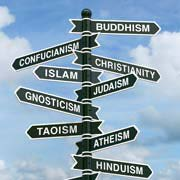A few weeks ago I was speaking with a young adult in my church; we’ll call her Betty. Betty had just begun her first semester in college and discovered that one of her professors was very vocal about his atheism. Betty explained that the professor wasn’t necessarily hostile to Christianity, but that she had already observed that the professor never missed a chance to take a shot at religious belief. I was very encouraged when Betty told me that she knew how to address some of her professor’s objections because of our church’s Bible Study meetings. However, there was one objection that Betty didn’t know how to deal with. She told me that part of her professor’s gripe was that there was no way to know which religion was true.
I gave her an analogy to help her expose her professor’s faulty thinking. Imagine that you’ve discovered a complex and highly detailed statue and you want to know how it was built. You begin to ask around and what you find is that there are five sincere people that claim to know, but each of them have a completely different answer. Would it be reasonable to conclude that there’s no way to know, just because each answer was different? Obviously not. There seem to be two possibilities; either all five answers are wrong or only one of the five answers is right. By comparing the features of the statue to the five answers that are given, you might find that one answer is stronger than the others. You may also find that all five answers seem wrong and reject them all. However, even if all five answers were wrong, that would not mean that there is no answer.
Betty’s professor has taken a faulty logical step in assuming that just because there are different religions, there can be no way to find out which one is true.
Paul addresses this issue in Acts 17:26-27:
“And He made from one man every nation of mankind to live on all the face of the earth, having determined allotted periods and the boundaries of their dwelling place, that they should seek God, and perhaps feel their way toward Him and find Him. Yet He is actually not far from each one of us.”
We live in an amazingly vast and complex universe and it has dawned on people for centuries that there must be a higher power or ultimate source beyond the universe that brought it into existence. It seems irrational to conclude that the universe somehow created itself. Paul is explaining that we were purposely created with a desire to seek and discover this higher power. Thus it’s quite natural that at different times in the history of mankind people have come up with different, yet seemingly plausible explanations for how or why the universe came to be.
How then do we choose among the many different explanations? Paul goes on to explain in Acts 17:30-31:
“The times of ignorance God overlooked, but now He commands all people everywhere to repent, because He has fixed a day on which He will judge the world in righteousness by a man whom He has appointed; and of this He has given assurance to all by raising Him from the dead.”
The Bible teaches that God has not abandoned us to wander around searching for Him in vain. Paul is teaching us that God has distinguished Christianity from the rest. Through the resurrection of Jesus Christ God has provided an authentic historical foundation that we can use to distinguish Christianity from all other world religions.
As Christians, the Resurrection is a truth that we must always remember.

